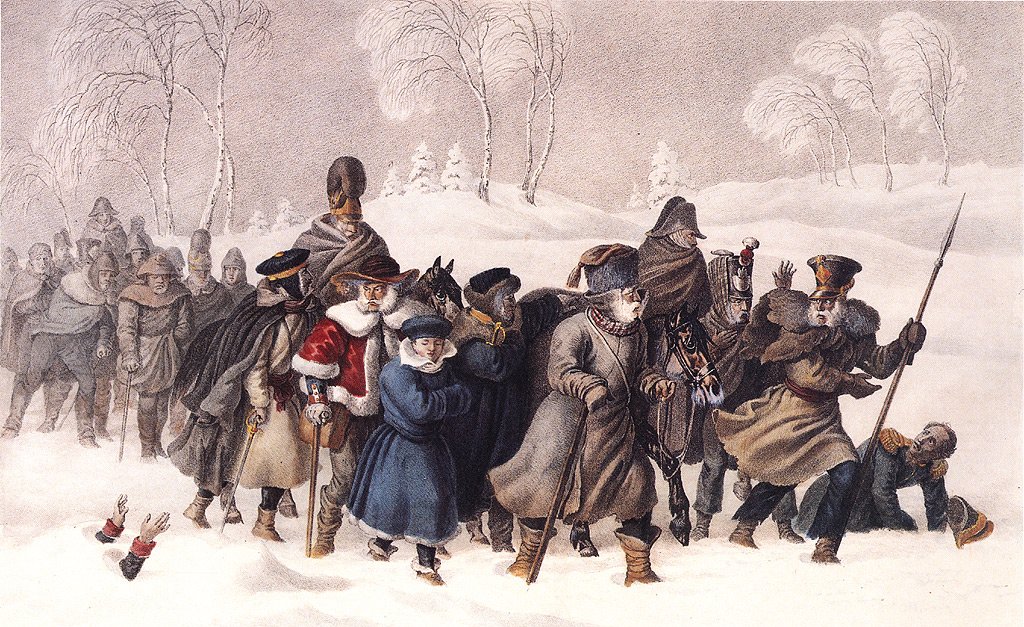
#OTD 14 December, 1812, Marshal Ney made his final stand against Platov on the bridge across the Neman River. The last day of the Campaign of 1812, thus, eternalized him as "the last of the ‘Grande Armée' who left the Russian territory." (Abbott)
#Voicesfrom1812

#Voicesfrom1812
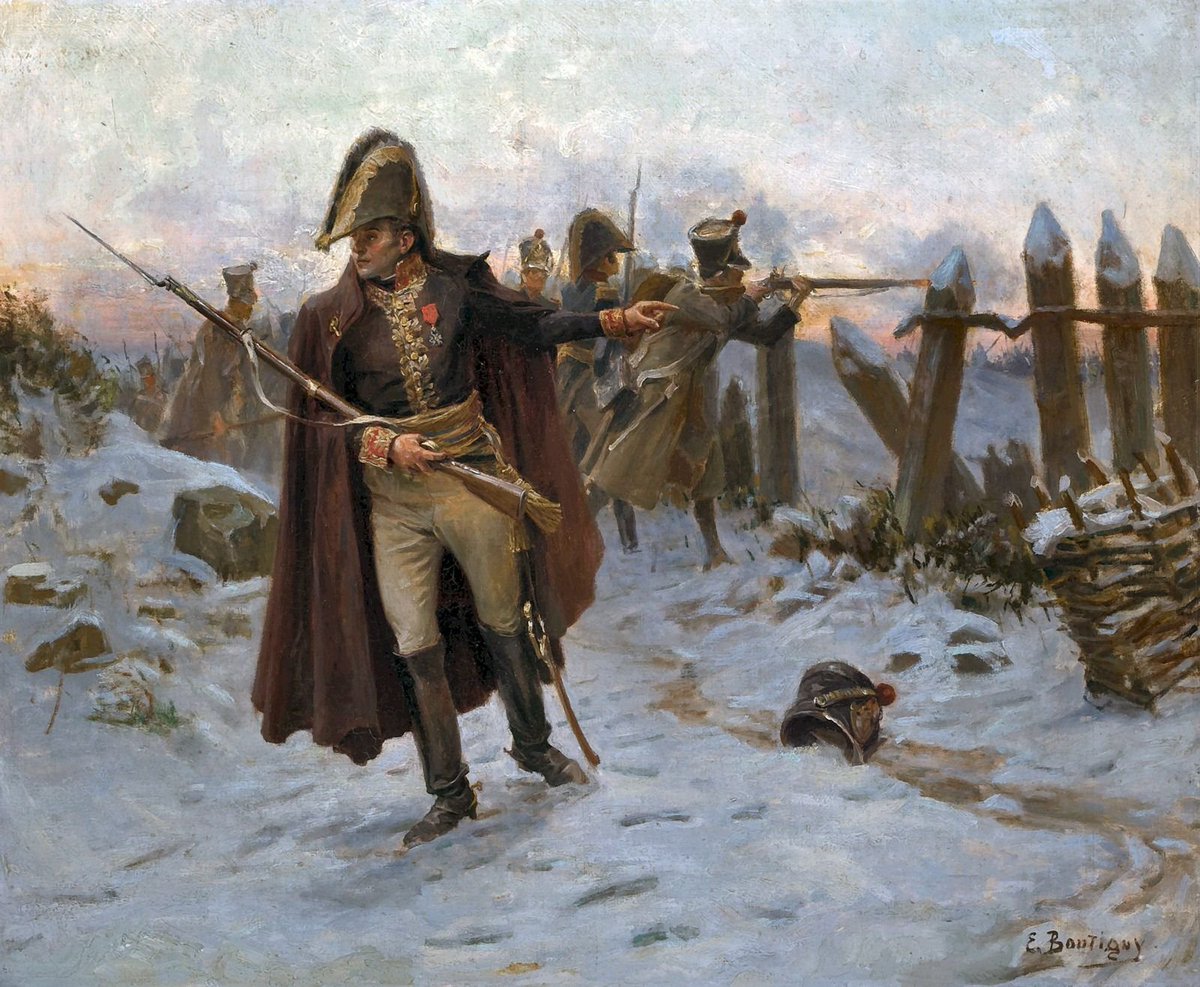

“The English…will end by subscribing to all that the Americans desire, and the American government, placed in the hands of able statesmen, will gain increased strength.”
After a lengthy discourse on the Anglo-American relations, Napoleon took a nap for 45 minutes.
After a lengthy discourse on the Anglo-American relations, Napoleon took a nap for 45 minutes.

It was midnight, 14 December, when he and Caulaincourt entered Dresden. The former ambassador went round knocking at doors to inquire the French minister’s address, and succeeded on the second attempt.
They were directed to the house of Jean-Charles Serra.
They were directed to the house of Jean-Charles Serra.

The Genoa-born minister had “everything ready, as though he had been waiting” for the unlikely guests. Napoleon wrote off dispatches for Berthier, Emperor Franz II, and Warsaw, and caught another hour’s sleep before the arrival of King Frederick Augustus I of Saxony.
His letter to Franz II read:
“Monsieur my brother and very dear father-in-law,
I am stopping for a moment in Dresden to write to Your Majesty my news.
Despite rather great fatigue, my health has never been better.
“Monsieur my brother and very dear father-in-law,
I am stopping for a moment in Dresden to write to Your Majesty my news.
Despite rather great fatigue, my health has never been better.

I left on the 4th [5th] of this month, after the Battle of Berezina…leaving the Grand Armée under the orders of the King of Naples, the Prince of Neuchâtel continuing to perform the roles…
I will be in Paris in four days; I will stay there for the winter months…
I will be in Paris in four days; I will stay there for the winter months…
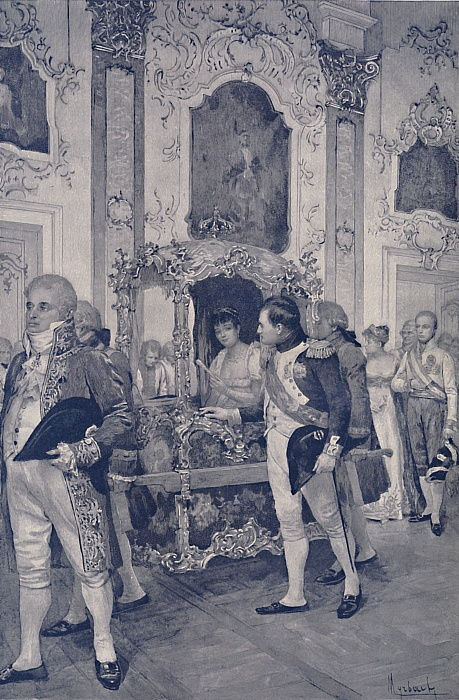
to go tend my most important business. Perhaps Your Majesty will consider it useful to dispatch someone there in the absence of your ambassador, whose presence is very useful to the army.”
And then he got down to the crux of the matter- making up for the army lost:
And then he got down to the crux of the matter- making up for the army lost:
“The various bulletins…will have informed Your Majesty of all the events…It would be important, under these circumstances, for Your Majesty to mobilize a corps from Galicia to Transylvania, thus increasing your entire force to 60,000.”
(Napoleon to Franz II, 14 Dec 1812)
(Napoleon to Franz II, 14 Dec 1812)

Napoleon seemed to assume that his marital relations would cement the uneasy alignment between Austria and France. But it was exactly on this day when Schwarzenberg received Berthier’s dispatch written on the 9th, informing him that “the army is about to march to Kovno.”
Up to now, reports of the French ‘victory’ at the Berezina had kept him lingering around Slonim, waiting for the main army to join him. As soon as he became, in Wilson’s words, “acquainted with the disasters,” the prince realized that he had served his purpose. (Clausewitz)
He would do just as Berthier had instructed-“to maneuver in the direction of Białystok.” (Berthier to Schwarzenberg, 9 December 1812)
The only difference between him and the main army was that “he had satisfied himself of the true situation of affairs.” (Clausewitz)
The only difference between him and the main army was that “he had satisfied himself of the true situation of affairs.” (Clausewitz)
Unaware of Schwarzenberg’s exit, Chichagov quitted Vilna on the same day. Wilson’s private diary reveals that he still assumed the Austrians to be “running Volhynia,” placing “the Russian Army on the defensive on an untenable line from Minsk…not a cheering prospect.”
Chichagov pressed for Novi-Troki on the Neman, lying on the shortcut taken by few Polish troops and Rapp, who was “begged…to trust to them.” (Rapp)
He was late again; Lieutenant Gawroński of the 12th Infantry recorded that his party “reached Troki without any incident.”
He was late again; Lieutenant Gawroński of the 12th Infantry recorded that his party “reached Troki without any incident.”

It was 3 a.m. when Frederick arrived. Caulaincourt recorded:
“[Napoleon] insisted on His Majesty's receiving him in bed; consequently I had the honor of taking the King immediately to his apartment. The two sovereigns were together for three-quarters of an hour.”
“[Napoleon] insisted on His Majesty's receiving him in bed; consequently I had the honor of taking the King immediately to his apartment. The two sovereigns were together for three-quarters of an hour.”
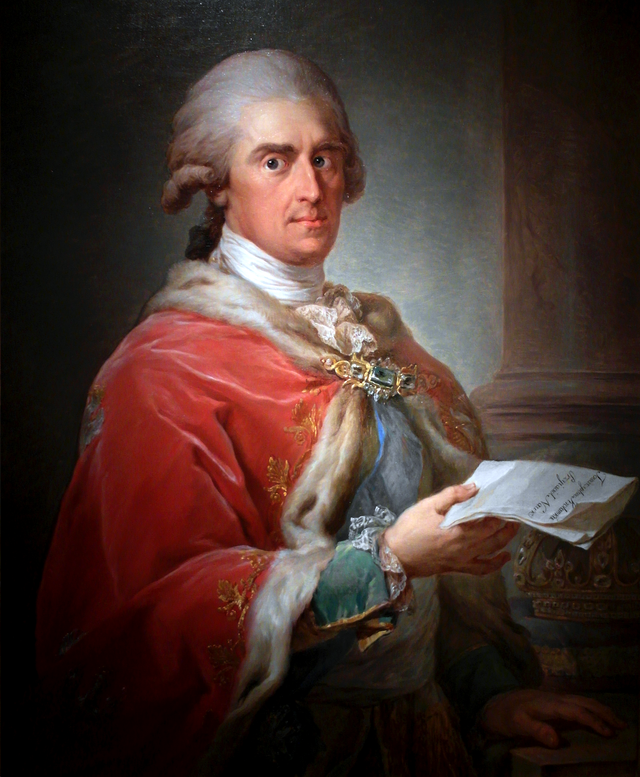
Through this bizarre exchange, also witnessed by Count Loss and Marcolini accompanying their King, Napoleon sought to mitigate any repercussions of his defeat. Of course, there was nothing to prevent the ghoulish soldiers from scaring the townsfolk in the German states.
Just as the travellers set out for Erfurt, the overworked sledge broke again. Frederick lent him “his berline fitted with runners.”
After the Coalition’s reoccupation of Dresden in 1813, an Englishman would purchase the former as “a historical relic.” (Caulaincourt)
After the Coalition’s reoccupation of Dresden in 1813, an Englishman would purchase the former as “a historical relic.” (Caulaincourt)
At 5 a.m., Napoleon set out for Erfurt, where he and Tsar Alexander had met each other for the last time. He talked wistfully of his marshals who had accompanied the journey-Lannes in particular- and Alexander, 'the Talma of the North.' 

“Dusk was falling” after two relay stations, when Napoleon lapsed deep into nostalgia. The names Tilsit and Erfurt evoked poignantly bittersweet memories of his short-lived friendship with the young Tsar, who had appeared “weary of sovereign power and a monarch's life.” 

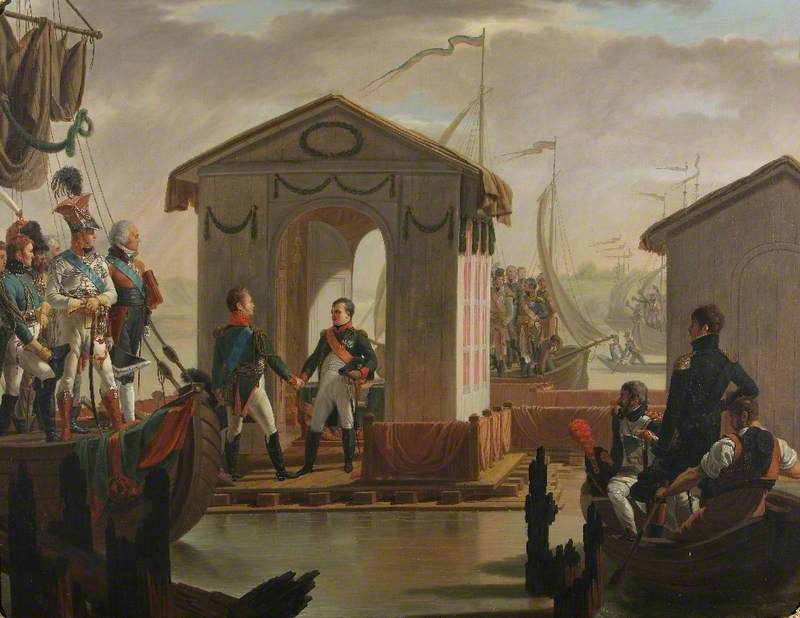

“He was a conscientious private individual, not a prince,” remarked Napoleon. He attributed to the young man’s lackadaisical, callow facade his childless, unhappy marriage with Empress Elizabeth. He did not know that his invasion had fomented their belated reconciliation. 
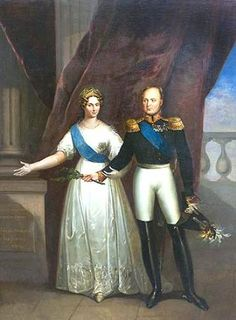
Napoleon judged Alexander to be “very religious” yet “too liberal in his views and too democratic for his Russians.” He remarked snidely, perhaps alluding to the history of assassination of the Tsars:
“He will be the victim of this: that nation needs a strong hand.”
“He will be the victim of this: that nation needs a strong hand.”

The French throne would be more becoming of him, for:
“he is just the sort of king the French would like. Gallant to women, flattering with men, even with those towards whom he ought to show his displeasure…his fine bearing and extreme courtesy are very pleasing.”
“he is just the sort of king the French would like. Gallant to women, flattering with men, even with those towards whom he ought to show his displeasure…his fine bearing and extreme courtesy are very pleasing.”

In essence, Alexander was his foil in every way. He admitted a singular point of incompatibility between himself and Alexander:
“Your good Frenchman loves flattery. He does not like my serious mien, and my firmness often proves irksome to him.”
“Your good Frenchman loves flattery. He does not like my serious mien, and my firmness often proves irksome to him.”

He sentimentally recalled how the Tsar had undergone a transformation between Tilsit and Erfurt:
“He came to Erfurt quite a different man from what he appeared to be at Tilsit. I noticed at Erfurt that he was defiant and unspeakably obstinate.
“He came to Erfurt quite a different man from what he appeared to be at Tilsit. I noticed at Erfurt that he was defiant and unspeakably obstinate.

He wanted to treat with me as between equals. As a matter of fact, circumstances were in his favor and he took advantage of them.”
The Emperor, then, turned increasingly cynical, dwelling on the ephemeral nature of integrity before power.
The Emperor, then, turned increasingly cynical, dwelling on the ephemeral nature of integrity before power.

He lamented how “the men who are so proud of bearing a title today” fall into the same errors-envy and ingratitude.
In this regard, the old noblesse d'épée-“This even applies to you, Caulaincourt,” Napoleon emphasized-were much more consistent in their devotion.
(More)
In this regard, the old noblesse d'épée-“This even applies to you, Caulaincourt,” Napoleon emphasized-were much more consistent in their devotion.
(More)

He named Bessières, Lefebvre, and Lannes as exemplifying that tragic flaw, but spoke of Daru as “a man of rare capacity” and Junot as the only one who “does not share this weakness.”
Mentioning Lannes once again, he connected the dots between the two previous topics.

Mentioning Lannes once again, he connected the dots between the two previous topics.


Napoleon claimed that his friend, who had escorted Alexander to Erfurt, stepped over the boundaries of his duties and shared “intimate details and cited facts to enlighten the Tsar” to “prevent him from becoming the Emperor's dupe.”
This, in turn, “explained Alexander's conduct and his distrust at Erfurt.” He suspected that Lannes, whom he still held in the utmost esteem, had done this on purpose out of “an old grudge” against him, probably after Napoleon scolded him for some impetuous behavior. 

“Men are like that, Caulaincourt," said the Emperor. "I am condemned for holding them in slight esteem. Am I wrong?“
He muttered as the carriages trundled into Leipzig. (Caulaincourt)
He muttered as the carriages trundled into Leipzig. (Caulaincourt)
Had he known what Murat had been talking about, he would have regretted not including him in the list. Murat, who had camped at Skrauda last night, called for an impromptu meeting. “I know not what evil genius it was that inspired him at this council,” wrote Segur.
As soon as he untangled himself from the scourge at Kovno, he seized the opportunity to curse Napoleon-“that it was no longer possible to serve such a madman! That there was no safety in supporting his cause.” (Ibid)
Thiers explains that Murat was vexed at “a state of things which imperiled the safety of the crowns possessed by the Bonaparte family,” including his. Segur, sharing his view, adds that this King expressed his “despair for having rejected the propositions of the English.”
It is remarkable that Davout, who had often been seconded to the Emperor’s brother-in-law throughout the campaign, cut him off immediately: (Thiers, Segur)
“But as to you, you are only a king by the grace of Napoleon, and of the blood of Frenchmen;
“But as to you, you are only a king by the grace of Napoleon, and of the blood of Frenchmen;
You cannot remain so but through Napoleon, and by continuing united to France. You are led away by the blackest ingratitude!”
While the other marshals were at a loss for words, Davout went forth to declare his speech a treason. (Segur)
While the other marshals were at a loss for words, Davout went forth to declare his speech a treason. (Segur)
Murat, a simple man, felt a pang of guilt and fell silent. With the benefit of hindsight, Segur commented:
“Thus was stifled the first spark of treachery, which at a later period was destined to ruin France. It is with regret that history commemorates it…”
“Thus was stifled the first spark of treachery, which at a later period was destined to ruin France. It is with regret that history commemorates it…”
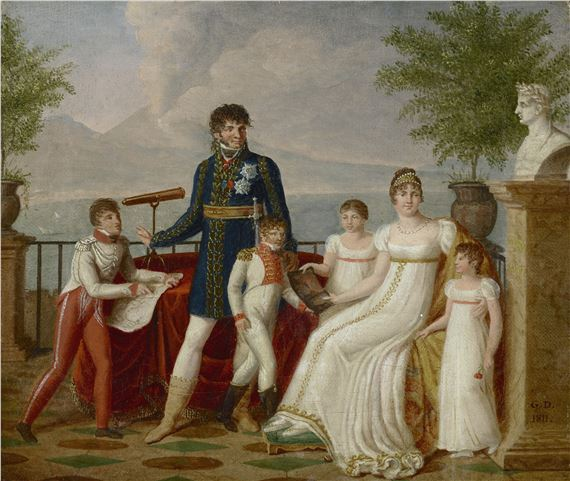
In contrast to Murat, one man was obstinate about "performing for France a last service, the only one..." (Thiers)
When the bulk of the army had arrived "at the other side of the stream, like shades returned from Hades," he voluntarily descended back into it.
(Labaume)
When the bulk of the army had arrived "at the other side of the stream, like shades returned from Hades," he voluntarily descended back into it.
(Labaume)

At daybreak, after an all-or-nothing struggle to defend Kovno from Platov, Ney’s rearguard trudged across the frozen excesses of the Neman. Without the derelict bridge, ignored by many, the water would barely have been distinguishable from the ground.
Fezensac mused as saw the Russian soil for the last time.
“We crossed the stream and looking back toward the frightening country we were leaving, we congratulated ourselves on having quitted it and on the honor of having been the last do so.”
“We crossed the stream and looking back toward the frightening country we were leaving, we congratulated ourselves on having quitted it and on the honor of having been the last do so.”
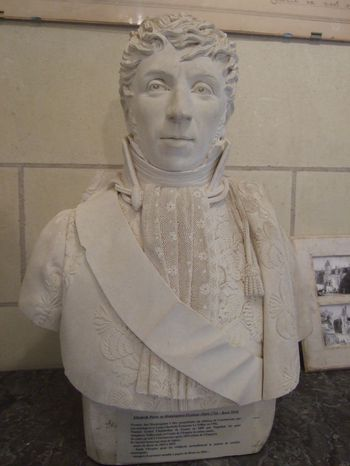
But as Segur interrupts his ostensibly lulling narrative, “at that moment the second attack of the Russians commenced on the other side of the Neman…near the bridge of Kovno.” Fezensac saw those at the front “running back telling us that they had encountered Cossacks.”
Two battalions of Cossacks, armed with “some guns, all drawn on sledges,” were descending the same height of Alexioten. Ney’s men, who only had a single piece of gun left, had not yet completed the crossing. (Marbot, Wilson, Thiers, Segur)
The officer in charge of the only gun had fled. According to Segur, Ney flipped out at his cowardice, “darted forward, and elevating his sword,” nearly killing him until an ADC-presumably Fezensac-“warded off the blow, and enabled this miserable fellow to make escape.”
Once again, Ney found himself beleaguered. The Russians advanced in two streams, the first column from the direction of Vilna and the other, already across the Neman, pouring down cannonballs from the Alexioten Hill. (Segur, Fezensac)
“This last attack, the most unexpected of all,” as Fezensac witnesse, “was the one which most overwhelmed the soldier.” But nothing was new to the intrepid marshal; after all, he had walked out of Vyazma and Krasny alive, too irritated to be afraid of the enemy. 
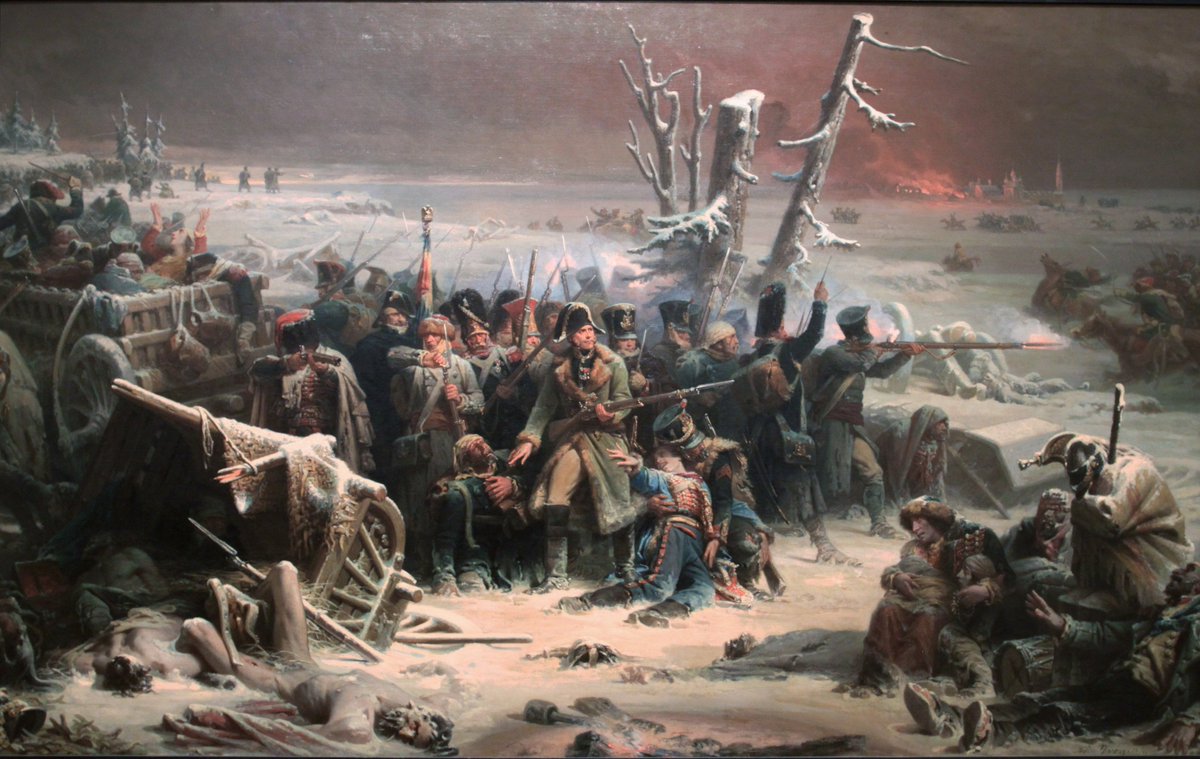
He ordered Marchand and Ledru “to form a sort a battalion by incorporating into the III Corps all the isolated soldiers,” and “tried in vain to force a passage.” They had long given up evading the enemy artillery, lest they expose themselves to a lethal cavalry charge. (F.)
Spearheading them was the marshal himself, alongside Gérard and his aide-de-camp Heymès, rallying 30 to 40 bravest men of the III Corps. In this way, the apparitions of the Grande Armée “still breathed completely and entirely in Marshal Ney.” (Segur) 
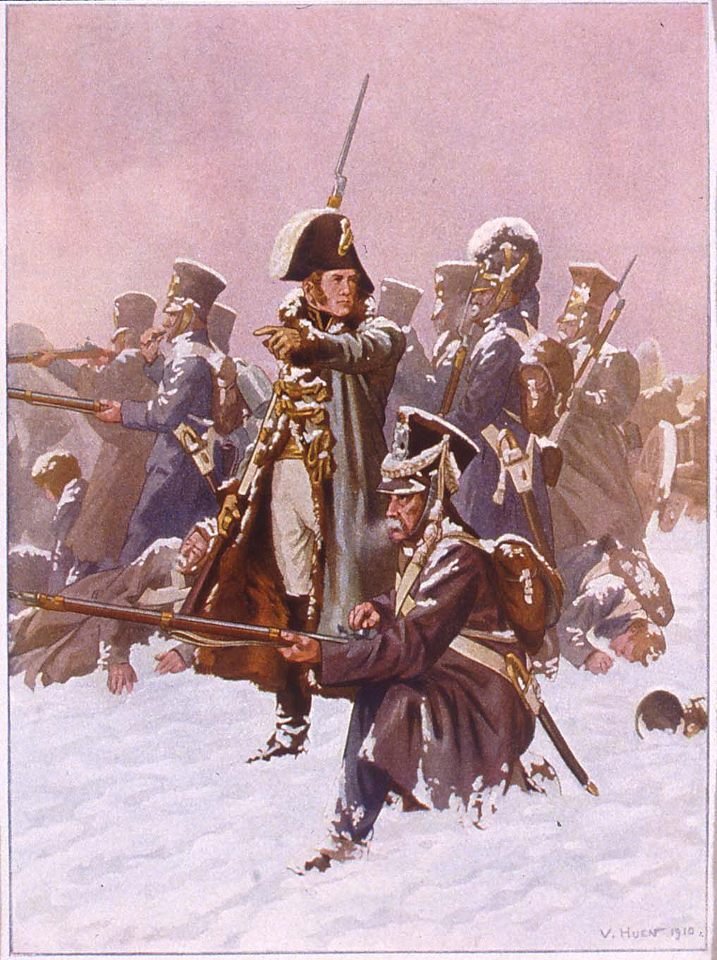
The panicking pleaded that they rather return to Kovno and surrender. Fezensac, on behalf of the Marshal, “tried in vain to restrain them,” exhorting them “if their death were inevitable…at least to die with us.” Some refused to and “disappeared shortly afterward.”
When he saw one of his loving friends among them, he nearly plunged into an abysmal despair. But “Marshal Ney appeared at this juncture, showing not the slightest concern over such a desperate situation. His prompt determination saved again and for the last time.” (Fez.) 
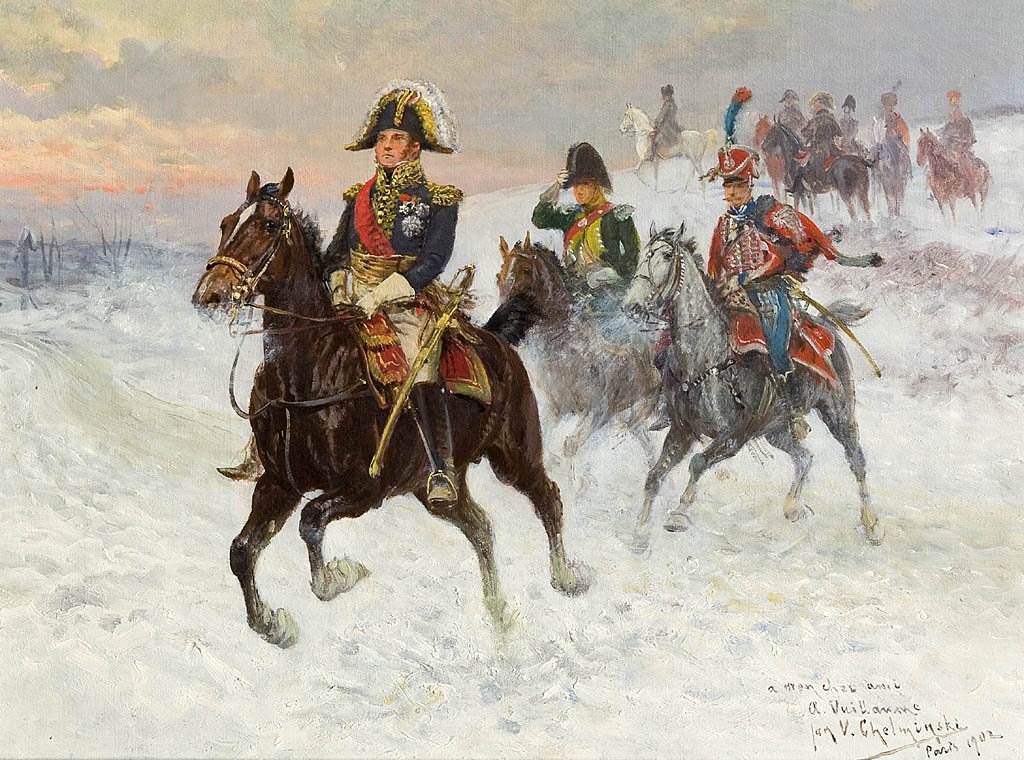
Jomini, in his memoir, illustrated Ney’s galvanizing presence at the bridgehead: “Valiant as Achilles, and strong as Ajax and Diomede, this hero seized a musket, and throwing himself upon the enemy with forty brave men, cut his way through the ranks of his astonished foes.” 

Ney did not let gallantry cloud his sense of reality. Seeing the road ahead-the one to Gumbinnen taken by the main army-hopelessly infested with the Cossacks, he decided to bypass it. Instead, once all were across, they would head to the crossroad to Tilsit and Königsberg.
Of course, he was aware that this action meant “leaving the rest of the army without a rearguard.”
“But,” as Fezensac earnestly explained, “there was no other way, and necessity determined our duty. The darkness of the night favored this movement.”
(More/Replies)
“But,” as Fezensac earnestly explained, “there was no other way, and necessity determined our duty. The darkness of the night favored this movement.”
(More/Replies)
They slowly crossed the river, while more and more faded away, merging with the blackened horizon. Ney’s final moment at the Neman has been immortalized by J.S.C. Abbott:
“At last, having seen every man safely across the river, he slowly retired, proudly facing the foe.
“At last, having seen every man safely across the river, he slowly retired, proudly facing the foe.

The bullets flew thickly around him; still, he disdained to turn his back upon the foe or to quicken his pace. Deliberately walking backward, he fired the last bullet at the advancing Russians, and threw his gun into the stream. 

He was the last of the ‘Grande Armée' who left the Russian territory." (J.S.C. Abbott, Jomini)
It was 8 o’clock at night, on 14 December, when Ney stumbled into a village on the opposite bank. (Segur, Fezensac)
It was the end of the Campaign of 1812.
It was 8 o’clock at night, on 14 December, when Ney stumbled into a village on the opposite bank. (Segur, Fezensac)
It was the end of the Campaign of 1812.
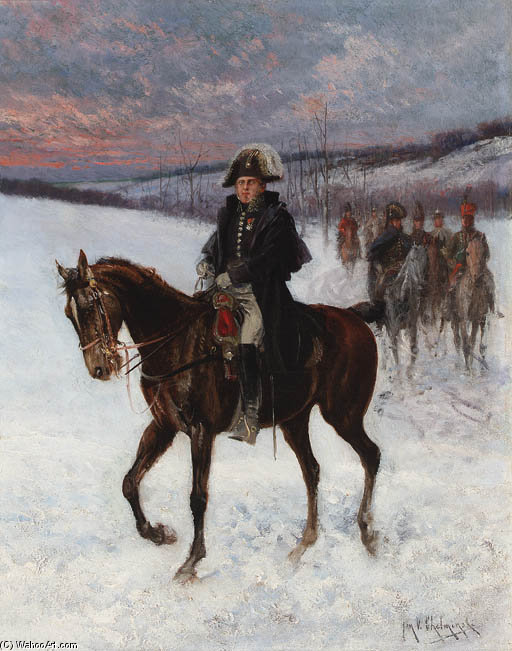
-End of the Thread-
How are you people.
I am dead tired.
How are you people.
I am dead tired.
@threadreaderapp Unroll.
• • •
Missing some Tweet in this thread? You can try to
force a refresh












